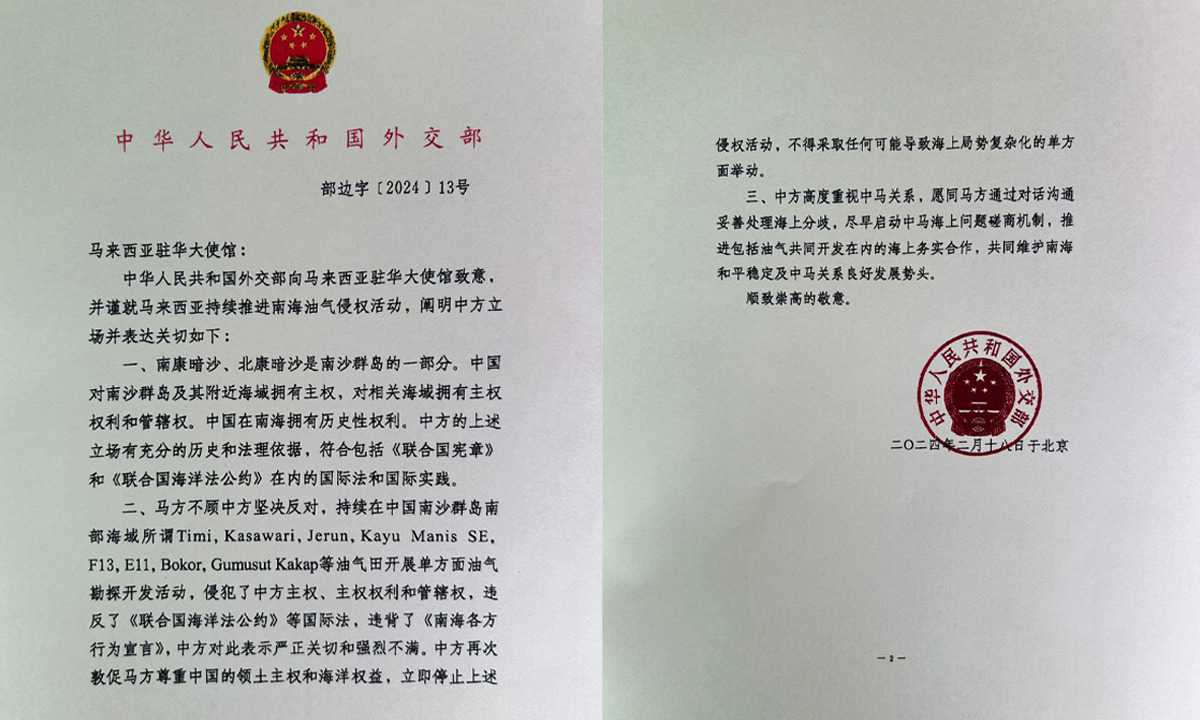South China Sea: Beijing asks Kuala Lumpur to stop exploration activities
Malaysia's state-owned company operates in areas that are under national sovereignty. In a note sent to the Malaysian embassy, China expressed its displeasure, even though Premier Anwar Ibrahim had previously hinted at the possibility of negotiations to resolve the issue of Chinese claims.
Kuala Lumpur (AsiaNews) - China has asked Malaysia to stop all oil exploration activities off the coast of Sarawak State, where the Petronas company operates. A demand made through a protest note sent to the Malaysian embassy in China last week, according to the Philippine Daily Inquirer, which published the document. ‘The Chinese side, once again, urges the Malaysian side to genuinely respect China's territorial sovereignty and maritime interests and immediately stop exploration activities,’ the note reads.
China accuses Malaysia of encroaching on the areas bounded in the South China Sea by the so-called nine-dash line, over which Beijing claims sovereignty, even though this is an area only 100 kilometres from Sarawak and almost 2,000 kilometres away from mainland China. And even though in 2016, the Permanent Court of Arbitration in The Hague declared the Chinese claims null and void.
The document also expresses some disappointment with oil and gas exploration activities near the Luconia Reef, an area the Malaysians call ‘Gugusan Beting Raja Jarum’, and China knows as ‘Nankang Ansha’ and ‘Beikang Ansha’. The area is located about 150 kilometres north of Malaysian Borneo, within Malaysia's 200-nautical-mile exclusive economic zone.
In recent years, China has increased the number of military activities in the South China Sea in an attempt to assert its territorial claims, colliding with Taiwan and South-East Asian countries.
In contrast, Malaysian Prime Minister Anwar Ibrahim, in an attempt to calm tensions, has so far used conciliatory diplomatic tones. Only three months ago, the premier had called China a ‘true friend’. ‘People say, Malaysia is a growing economy. Do not allow China to abuse its privilege and extort money from the country. I said no. On the contrary, we want to benefit from each other, we want to learn from each other and we want to profit from this engagement,' Anwar Ibrahim had said during Chinese Prime Minister Li Qiang's visit on 20 June.
Last year, Anwar had sparked outrage for suggesting that the government was ready to negotiate China's territorial claims in the South China Sea. ‘I stressed that Malaysia considers the area as Malaysian territory, so Petronas will continue its exploration activities,’ the premier had said, briefing Parliament. ‘But if China believes this is its right, Malaysia is open to negotiations.’
Statements that had drawn immediate condemnation from the Malaysian opposition, represented by the Perikatan Nasional coalition. Former Prime Minister Muhyiddin Yassin had commented that Malaysia's territorial rights are not available for negotiation ‘even if they are claimed by China’. The government had later clarified that the premier's comment signalled a willingness that all South China Sea issues be resolved peacefully.
Malaysia has exercised sovereignty over the atolls and reef of Luzonia since 1963, and in 1974 the government incorporated the energy company Petronas, giving it exploration rights.
As pointed out by the US Energy Information Administration, there are nearly 3.6 billion barrels of oil and over 40 trillion cubic feet of natural gas in the South China Sea between certain and probable deposits. According to data from Rystad Energy in Oslo, most of these resources are located within Chinese waters (1.4 billion barrels of oil and 5.7 trillion cubic feet of natural gas) and Malaysian waters (1.3 billion barrels of oil and 29 trillion cubic feet of natural gas).
According to data from the Malaysian Investment Development Authority, the oil and gas industry contributes about 20% of Malaysia's GDP. As stated by Singapore's Yusof Ishak Institute, the industry ‘has been very effectively harnessed for long-term economic development’ through the promotion of domestic entrepreneurship.
12/02/2016 15:14
27/02/2024 16:59







.png)










